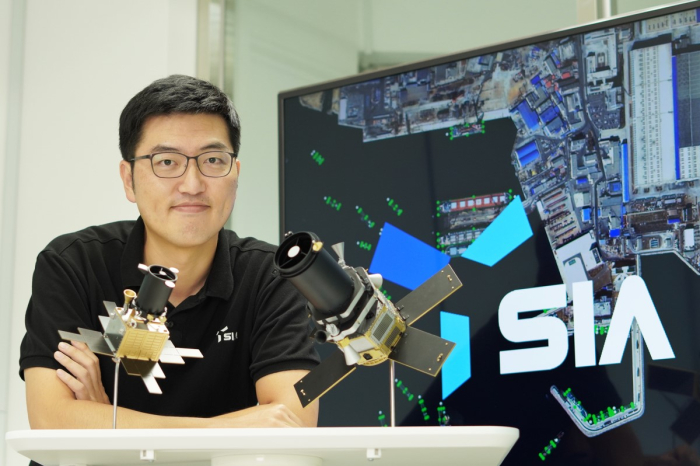Startups
SIA analyzes satellite data for companies, government and ESG
The satellite imagery analytics startup aims to launch satellite by 2024
By Sep 15, 2021 (Gmt+09:00)
3
Min read
Most Read
Samsung shifts to emergency mode with 6-day work week for executives


CJ CheilJedang to sell feed, livestock unit for $1.4 bn


Samsung Electronics' key M&A man returns; big deals in the offing


Affinity to buy SK Rent-a-Car at $572 mn, more deals expected


Keppel REIT to sell Seoul-based prime office T Tower



There are about 2,000 satellites in space, orbiting the earth and generating countless images without being confined to geographical boundaries. And SI Analytics Co. (SIA), a South Korea-based artificial intelligence startup, transpired from contemplating ways to utilize the vast library of satellite imagery.
ŌĆ£We realized that the satellite imagery data could reward mankind with usefulness -- improving human lives in ways that we'd never imagined of," said Jeon Tae-gyun, the chief executive of SIA, in an interview with The Korea Economic Daily on Sept. 14.
Founded in 2018, the startup was established under satellite manufacturer Satrec Initiative as a subsidiary. SIA analyzes satellite and aerial imagery via AI technology.┬Ā
According to Jeon, the advantages of satellite imagery include being able to capture any given space on earth -- but the problem is that there's too much data.
ŌĆ£Satellite data supply is increasing, but there are limited experts who can analyze the data, making AI essential as it can analyze the data most efficiently without taking any rest,ŌĆØ said Jeon.
SIAŌĆÖs AI technology is used across a wide range of industries with its clients including institutions and corporations such as the military, food companies and construction firms.
For example, in wartime situations, the AI can analyze satellite image time series and use the data for military operations. Also, the AI can use the satellite data to assess crop conditions globally and predict shipments of raw material alongside formulating appropriate measures.
Recently, SIA has been focusing on the environment, social and governance (ESG) initiative. The startup is developing an AI-based assessment of environmental impact by digitizing the observations of the atmosphere from satellites such as maps that identify areas of high carbon dioxide concentration.
ŌĆ£ESG is on the rise, but there isnŌĆÖt a concrete strategy for executing environmental assessment. But we can provide an objective assessment method via satellite data,ŌĆØ said Jeon.
AIMING TO LAUNCH A SATELLITE BY 2024
Despite having been around for just three years, SIA has built a team of 60 employees alongside logging revenue of 2.5 billion won ($2.1 million). Also, the future looks promising for the startup as the satellite intelligence market is expected to grow from $3.4 billion in 2018 to $9.7 billion in 2028, according to science and technology consulting firm Yooro Consulting.
The company's growth potential has caught the attention of investors. So far, SIA has secured around 13 billion won from investors including the Korea Development Bank and Medici Investment.
Currently, SIA is preparing measures to reduce its development costs. The startup receives satellite data from commercial satellite service providers abroad, but recently, the startup's parent company, Satrec Initiative, has begun developing its own earth observation satellite, SpaceEye-T.
The satellite is slated to launch in early 2024 and if it goes smoothly, Satrec Initiative will possess a satellite that can collect various types of data that are essential to companies.
ŌĆ£Once we secure our own satellite, not only will we be cutting down data costs, but weŌĆÖll have access to the data that we want,ŌĆØ said Jeon, adding that SIA is expected to gain a powerful competitive edge since there are hardly any data providers that have their own satellite.
Write to Min-ki Koo at kook@hankyung.com
Danbee Lee edited this article.
More to Read
-

-

-
 Aerospace & DefenseInnospace, LIG Nex1 to co-work for space, defense business
Aerospace & DefenseInnospace, LIG Nex1 to co-work for space, defense businessApr 17, 2024 (Gmt+09:00)
-

-

Comment 0
LOG IN


